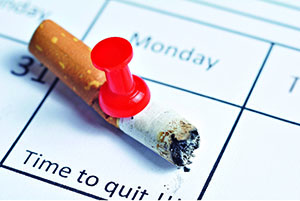Kicking the butt
Kathmandu
Amid rising concerns about COVID-19, the Ministry of Health and Population (MoHP) and health experts recommend several ways to boost the immune system and protect oneself against the virus. Quitting smoking is one.
Urging smokers to quit to reduce risk of severe outcome if they get COVID-19, Senior Chest Physician and Pulmonologist Dr Niraj Bam at the Department of Pulmonology and Critical Care Medicine, Tribhuvan University Teaching Hospital (TUTH) says, “Smoking leads to generation of harmful enzymes in body that allow coronavirus to gain access into the lung cells. Also COVID-19 tends to attack the receptors (cells) of the lungs accelerating inflammatory markers, subsequently blocking or narrowing the breathing passage. Smoking does the same while decreasing immunity to fight it.”
It’s the smokers and people with diseases such as bronchial asthma, COPD, pneumonia, lung cancer and low immunity power who have high chances of getting severely affected by COVID-19 as these diseases “help the virus enter their lungs, where it replicates and attacks”.
Pointing out smokers have a high mortality and morbidity rate, he says, “The lockdown can be an opportunity for tobacco addicts to kick the habit.”
However he has also observed that “there are people who are smoking more as compared to earlier”. So, how can one quit smoking?
As per Dr Bam, “The best possible way to quit is to stop smoking this very moment. And never go back to it. Be determined and dedicated to your decision.” He opines that if one manages to not smoke for 14 days, there’s a high chance that one might be able to leave it altogether. But opting for e-cigarettes and vape as alternatives “will be the biggest mistake as these will be affecting the lungs severely”.
Individuals like Sudhir Sharma, a MBA student, are grappling with withdrawal symptoms. Sharma had been smoking about 9-10 cigarettes a day for past eight years — “I wanted to quit but couldn’t. The need to quit was always at the back of my head.”
Now that he has quit smoking (a week ago), he says, “I am going through mood swings. I get anxious, irritable and restless. The desire to smoke is sky high. I quit as I got to know how risky it is in relation to COVID-19, but I don’t think I will be able to for long. I am not being able to cope with this situation.”
Addressing the problem that Sharma is going through, Dambar Raj Bhatta, Psychotherapist said, “Smokers like Sharma fall under high level of nicotine dependence category. To help such individuals cope with the situation, a detailed assessment needs to be done. The help of a psychotherapist would be required in such cases.”
Going cold turkey may be the best possible way, but Bhatta, who has helped numerous smokers deal with withdrawals, does not see this as an effective approach. “It might create imbalance in mental functioning. Instead one should opt for alternative methods like meditation, engaging in hobbies to fulfil the craving led by anxiety. It’s necessary to find what kind of anxiety it is. And what could be done to normalise it. So taking help of psychotherapists (who are conducting sessions online) would be the best possible option.”
Bhatta informs there’s no need to panic due to changes in your (smokers’) behaviour once one quits as one will “experience physical and psychological withdrawal effects”. Suraj Shakya, Clinical Psychologist at TUTH, informs withdrawal symptoms disappear completely after two to four weeks of quitting “although for some, they may last longer”.
To successfully quit this habit he says, “You need to be mentally prepared for the reality of withdrawal symptoms and keep yourself motivated and busy.”
He suggests making a list of the benefits of quitting smoking, rereading it when the craving for a smoke hits, exercising more regularly during withdrawal, especially as a distraction from the craving, adding social pressure by telling people about your decision to quit, avoiding triggers such as drinking alcohol or watching movies where smoking is shown, and being realistic about how long the process can take.
He points out self-monitoring could be an essential step in helping oneself to cope with withdrawal. “Just follow and re-assess what you are doing. Remember you might be desperate for a smoke, but control your feelings at that particular time as it lasts for only a few minutes. If you can do this, you will win.”
A version of this article appears in e-paper on May 20, 2020 of The Himalayan Times.






